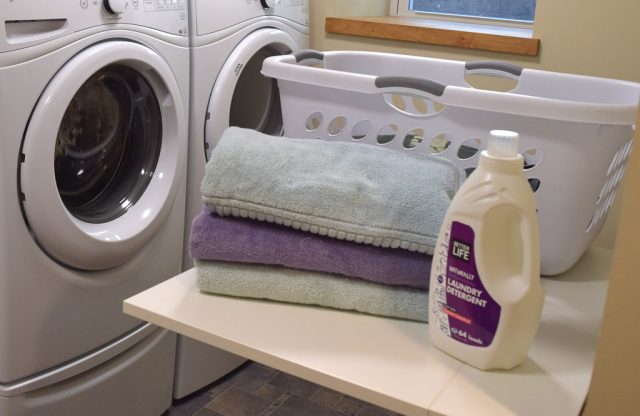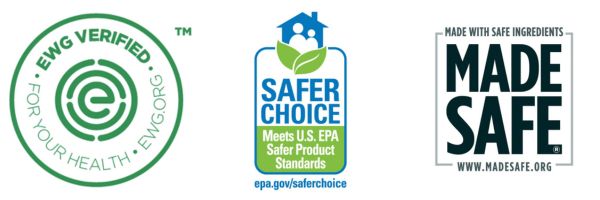Toxins in Laundry Detergent to AVOID (and What to Look for Instead)
Discover the worst toxins in laundry detergent that you should be avoiding and learn how to find a non-toxic laundry detergent that you can trust.

Why Switch to Eco-Friendly Laundry Detergent
So today we’re going to do a deep dive into laundry detergent. We’ll be answering questions like:
- Why you should stop using conventional laundry detergent immediately
- Which toxic chemicals should be avoided completely
- Why natural ingredients are healthier for YOU and the planet
- How to find the best non-toxic laundry detergent for your personal needs and preferences
There are a couple of big reasons why switching to non-toxic, natural laundry detergent is important and they both have to do with health.
Let’s dive in!
Find my top non-toxic laundry detergent recommendations here!

At Mindful Momma we only endorse products we’ve personally researched, tested, and honestly love. We may receive commissions from affiliate links in this article including Amazon Affiliates. Full Disclosure
Laundry Detergent Ingredients to Avoid for Your Health
It’s sad to say, but the manufacturers of most laundry detergent don’t have the health of your family in mind. They have profits in mind.
Conventional laundry detergents contains powerful chemicals and strong fragrances – even when they have been linked to negative health effects – so companies can sell more products and make more money.
Some of the harsh chemicals that may be harmful to human health include:
- 1,4-Dioxane – classified as a probable human carcinogen and has been detected in a number of brand-name liquid laundry detergents (you won’t find it on the label, as it is a byproduct of other ingredients)
- Artificial fragrances – may contain endocrine-disrupting phthalates and ingredients that lead to skin irritation and allergic reactions.
- Artificial colors and dyes – skin irritant
- Chlorine bleach – can burn skin and irritate eyes, nose and throat
- NPEs (nonylphenol ethoxylates) – imitates the hormone estrogen which impacts fetal development and reproductive health
- Quaternary ammonium compounds (quats) (used to soften fabrics) – linked to reproductive problems

Laundry Detergent Ingredients to Avoid for the Planet
Think about all the wastewater that drains out of your washing machine every week. Even if you use a high-efficiency washer, that’s still a lot of water.
Where does that water go? It probably goes to a water-treatment facility BUT that is not a magic disappearing act for all the chemicals found in the water. When water is released back into the environment, many harmful chemicals still remain.
Some of the most environmentally toxic chemicals in laundry detergent include:
- NPEs (nonylphenol ethoxylates) – toxic to fish and wildlife
- Chemical surfactants – cause deformities in fish and frogs
- Optical brighteners – not readily biodegradable and post a potential hazard to aquatic life
- Phosphates (mostly gone in laundry detergents) – promotes algae growth which leads to dead zones in rivers and lakes
Your laundry detergent is just one step – Get the full 5 steps to a green laundry routine here.

What to Look for in Non Toxic Laundry Detergent
So how do you know if a laundry detergent is safe, non-toxic and environmentally friendly? Here are a few things to look for in a safe laundry detergent:
- Biodegradable laundry detergent formula (phosphate-free)
- Plant-based ingredients
- Natural fragrances or unscented (*see note below)
- No chlorine bleach
- No NPEs
- No optical brighteners
- No artificial colors
- Septic safe
- No animal testing
- Concentrated formula (3x to 4x concentrated is most common but there is no standard)
- Recyclable packaging
*A note about fragrances: Fragrance is a complicated and evolving subject and some safer synthetic (phthalate-free) fragrances are now available. Still, my personal preference is for fragrances to come from natural essential oils or to use unscented laundry detergent.
Discover my FAVORITE laundry products of all!
Nice to Have’s for Eco-Friendly Laundry Detergent
- Made in USA – All the brands in this post are manufactured in the U.S. but some ingredients are globally sourced
- Plastic-free packaging – One of the reasons I like powdered laundry detergent is because it comes in a recyclable cardboard box
- EWG rating of EWG-Verified, “A” or “B” – Not every brand and product is listed on the Environmental Working Group’s cleaning database so it can be hard to compare
- “Sport” formula – Some brands offer “sport” formulas to tackle extra stinky odors and stains. As a mom of two active boys – I appreciate this!

Certifications for Eco Friendly & Non-Toxic Laundry Detergent
These third-party certifications show that the product has met strict requirements for human and environmental health.
- EWG VERIFIED™ – The Environmental Working Group’s strictest standard for ingredient safety
- MADE SAFE® – Products are screened against an extensive database of known harmful chemicals
- EPA Safer Choice – Meets specific requirements for safer chemical ingredients
- USDA Certified Bio-Based – Indicates the percentage of biobased material in product
- Leaping Bunny or PETA Certified – Allows no animal testing of finished products or ingredients
- EcoCert – Certifies natural & organic products and ingredients
- ECOLOGO – Products have undergone rigorous scientific testing and auditing for reduced environmental and health impacts
- B-Corp – Indicates a socially responsible company
Find my full list of clean laundry detergent picks here!
What do you look for in a laundry detergent? Leave a comment on the post!



